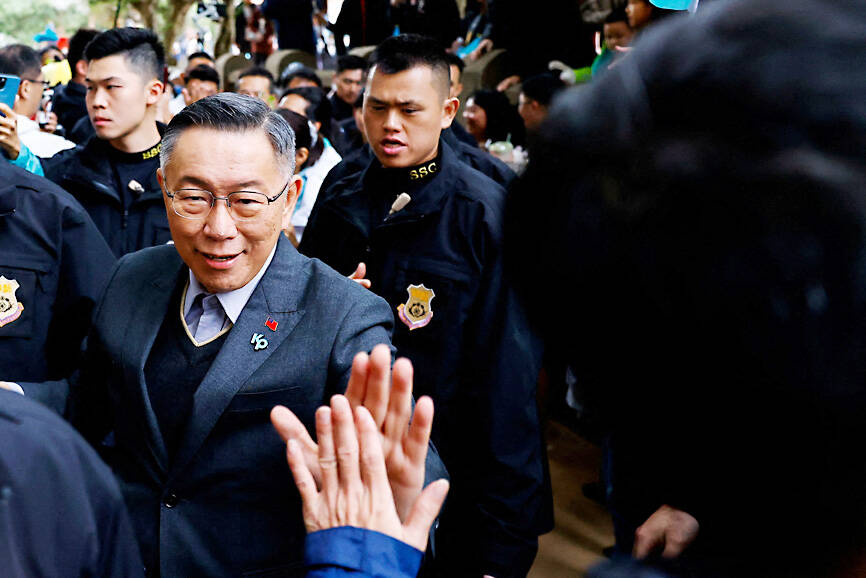If elected, Taiwan People’s Party (TPP) Chairman and presidential candidate Ko Wen-je (柯文哲) would form a coalition government, and might even ask former presidents to recommend candidates for the position of premier, who lawmakers could then choose from, he said in an interview published on Tuesday,
The government is run like a “dictatorship presidential system” or an “elected emperor system,” Ko said in an exclusive interview with Mirror Media magazine.
He said if he is elected, he would establish constitutional conventions so the president would be required to report and answer questions at the Legislative Yuan, appoint a premier with consent from the legislature, and freeze the budgets of the Control Yuan and Examination Yuan to balance and separate executive, legislative and judicial powers.

Photo: Ann Wang, Reuters
Ko said he would form a coalition government, enabling political parties to “become shareholders.”
For example, former presidents would each be asked to nominate two candidates for the position of premier, who lawmakers would vote on, he said.
Asked why he would make the best president, Ko said that only he can deal with China and the US, and the pan-blue and the pan-green camps at the same time.
He said if the presidential candidates were classified as “preferable, acceptable, tolerable and intolerable,” then only he would be considered “acceptable” by China and the US, while the Democratic Progressive Party’s (DPP) presidential candidate, Vice President William Lai (賴清德), would be considered “intolerable” by China, and the Chinese Nationalist Party’s (KMT) presidential candidate, New Taipei City Mayor Hou You-yi (侯友宜), would be “preferable” to China, but the US might give him a “question mark.”
Ko also asked if Hou is being a responsible mayor, as he took leave from his post only a month after being re-elected for a second term.
He said that the TPP is different from the KMT in that “aside from a few, KMT officials have been bought off by China.”
Although Hou said that he is against China’s “one country, two systems” policy, he embraces the so-called “1992 consensus,” and that when Chinese President Xi Jinping (習近平) talks of the “1992 consensus” Taiwan formula, it means there might be “one country, three systems,” Ko said.
He said as long as Taiwan maintains its current democracy, freedom, political system and lifestyle, he is willing to communicate with China.
The so-called “1992 consensus,” a term former Mainland Affairs Council chairman Su Chi (蘇起) in 2006 admitted making up in 2000, refers to a tacit understanding between the KMT and the Chinese government that both sides of the Strait acknowledge there is “one China,” with each side having its own interpretation of what “China” means.
Ko said Lai would not be a suitable president, as the risk of war would be heightened and the economy would worsen, as about 40 percent of Taiwan’s exports go to China and it would be difficult to suddenly change this.
The DPP would fail in communicating with China because it promotes “desinicization,” he said.

The inspection equipment and data transmission system for new robotic dogs that Taipei is planning to use for sidewalk patrols were developed by a Taiwanese company, the city’s New Construction Office said today, dismissing concerns that the China-made robots could pose a security risk. The city is bringing in smart robotic dogs to help with sidewalk inspections, Taipei Deputy Mayor Lee Ssu-chuan (李四川) said on Facebook. Equipped with a panoramic surveillance system, the robots would be able to automatically flag problems and easily navigate narrow sidewalks, making inspections faster and more accurate, Lee said. By collecting more accurate data, they would help Taipei

STATS: Taiwan’s average life expectancy of 80.77 years was lower than that of Japan, Singapore and South Korea, but higher than in China, Malaysia and Indonesia Taiwan’s average life expectancy last year increased to 80.77 years, but was still not back to its pre-COVID-19 pandemic peak of 81.32 years in 2020, the Ministry of the Interior said yesterday. The average life expectancy last year increased the 0.54 years from 2023, the ministry said in a statement. For men and women, the average life expectancy last year was 77.42 years and 84.30 years respectively, up 0.48 years and 0.56 years from the previous year. Taiwan’s average life expectancy peaked at 81.32 years in 2020, as the nation was relatively unaffected by the pandemic that year. The metric

TAKING STOCK: The USMC is rebuilding a once-abandoned airfield in Palau to support large-scale ground operations as China’s missile range grows, Naval News reported The US Marine Corps (USMC) is considering new sites for stockpiling equipment in the West Pacific to harden military supply chains and enhance mobility across the Indo-Pacific region, US-based Naval News reported on Saturday. The proposed sites in Palau — one of Taiwan’s diplomatic allies — and Australia would enable a “rapid standup of stored equipment within a year” of the program’s approval, the report said, citing documents published by the USMC last month. In Palau, the service is rebuilding a formerly abandoned World War II-era airfield and establishing ancillary structures to support large-scale ground operations “as China’s missile range and magazine

A 72-year-old man in Kaohsiung was sentenced to 40 days in jail after he was found having sex with a 67-year-old woman under a slide in a public park on Sunday afternoon. At 3pm on Sunday, a mother surnamed Liang (梁) was with her child at a neighborhood park when they found the man, surnamed Tsai (蔡), and woman, surnamed Huang (黃), underneath the slide. Liang took her child away from the scene, took photographs of the two and called the police, who arrived and arrested the couple. During questioning, Tsai told police that he had met Huang that day and offered to